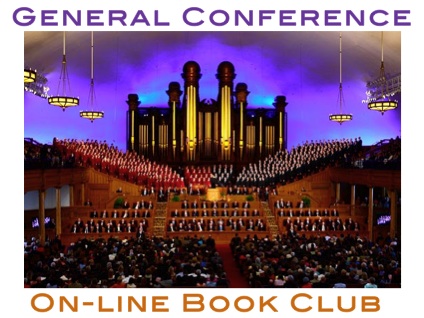Note: This is an edited version of a talk I was asked to give in Sacrament meeting in 2008 when I was the ward choir director in a ward in Springville, UT. I tried to shorten in a bit, but it’s still pretty long (it was a 10-15 minute talk…) I have been enjoying the Mormon Channel’s new Music Stream, and it made me think of this talk and all the wonderful principles I learned while studying for it.
I have a great testimony of the power of music. I have played and sung many pieces of musical importance, and performed in various venues throughout my life. I have several favorite pieces among the great composers of Debussy, Mendelssohn, Mozart, Bach, and others. But by far my favorite music to experience, whether by listening or performing, are the hymns.
There have been times when I have been able to share my testimony through the hymns, and those are the times when my testimony feels the strongest – unbreakable, unshakeable, and immoveable. In a way, I feel that the hymns, especially those in the Children’s Songbook, have provided the foundation for my gospel knowledge.
But the hymns didn’t provide that foundation on their own. I credit that foundation to the exposure my parents gave me to the hymns from an early age.
Ever since I can remember, there has been music in our home. The earliest of those memories has to do with the hymns. When my mother was a member of the Stake Relief Society Presidency, our family would travel to the different wards in our stake, often an hour or more away from our home. It would have been a lot easier for my mother to simply take the trip herself, but she would make us go with her, and our family would sing in the ward’s sacrament meeting. Often, the song was “Love is Spoken Here.”
My father has worked in family therapy for years, and once as a young child, our family went with him to a family retreat sponsored by his agency. One evening, while all the families were gathered after dinner, our family sang “Love at Home.” Our parents loved sharing truth through music, and so experiences like these were common for us.
President Boyd K. Packer said, “Parents ought to foster good music in the home and cultivate a desire to have their children learn the hymns of inspiration.” It is hard to cultivate that desire to learn the hymns if we ourselves, as their parents, do not cultivate the desire in us to learn the hymns.
Several years ago, Elder Oaks shared the following experience,
“I had finished a special assignment on a Sunday morning in Salt Lake City and desired to attend a sacrament meeting. I stopped at a convenient ward meetinghouse and slipped unnoticed into the overflow area just as the congregation was beginning to sing these sacred words of the sacrament song:
’Tis sweet to sing the matchless love
Of Him who left his home above
And came to earth—oh, wondrous plan—
To suffer, bleed, and die for man!
(Hymns, 1985, no. 177)
My heart swelled as we sang this worshipful hymn and contemplated renewing our covenants by partaking of the sacrament. Our voices raised the concluding strains:
For Jesus died on Calvary,
That all thru him might ransomed be.
Then sing hosannas to his name;
Let heav’n and earth his love proclaim.
As we sang these words, I glanced around at members of the congregation and was stunned to observe that about a third of them were not singing. How could this be? Were those who did not even mouth the words suggesting that for them it was not “sweet to sing the matchless love” or to “sing hosannas to his name”? What are we saying, what are we thinking, when we fail to join in singing in our worship services?
I believe some of us in North America are getting neglectful in our worship, including the singing of hymns. I have observed that the Saints elsewhere are more diligent in doing this. We in the center stakes of Zion should renew our fervent participation in the singing of our hymns.” (Dallin H. Oaks, “Worship through Music,” Ensign, Nov 1994)
I witnessed this myself when our family was attending a Portuguese ward here in Utah. The Brazilians in our Portuguese ward sang the hymns with such vigor and testimony I was almost moved to tears each Sunday during Sacrament meeting. Contrast that with our English speaking ward we recently started attending. The hymns during sacrament meeting are barely whispered, and there are many who do not sing or even mouth the words. We must sing the hymns. There is no other way to gain a testimony of their significance and importance.
You can download almost all the hymns of the Church, including the hymns from the Children’s Songbook, from the Church website. There are a few hymns that are not available for download due to copyright restrictions, but for the most part, you can download (for free) and listen to and learn any hymn that might be sung in Sacrament meeting.
The First Presidency Preface to the Hymnbook says, “Teach your children to love the hymns. Sing them on the Sabbath, in home evening, during scripture study, at prayer time. Sing as you work, as you play, and as you travel together. Sing hymns as lullabies to build faith and testimony in your young ones.” These are simple suggestions that make an eternal impact of the testimonies of your children. There is nothing more special than rocking my children to sleep singing “I am a Child of God.”
My husband often comments that I have a song for everything (almost any phrase or topic can get me singing something). This is especially true for gospel topics. The songs found in the Children’s Songbook teach very deep and significant doctrinal truths in a simple, joyous manner. If our children learn the songs of the Children’s Songbook, their gospel understanding will be much more advanced by the time they graduate from primary. There are songs in Primary that teach about the Plan of Salvation, as so eloquently and simply stated in the song “I Lived in Heaven.” Children learn of baptism through dozens of simple songs. They learn of the life of the Savior, the Savior’s love for them and for all His children. They learn about the importance of helping at home, of service, of love, of scripture study, and prayer by the words of a song. There is no basic gospel principle left out of the Children’s Songbook. Do you understand what a significant blessing that music is to your children?
Elder Packer encouraged all families to make sure that music lessons are a part of their children’s upbringing, and especially that parents provide the opportunity for children to learn to play the hymns of the Church. He said,
“The time for music lessons seems to come along when there are so many other expenses for the family with little children. But we encourage parents to include musical training in the lives of their children.
Somehow Andrew and Olive Kimball did, and Spencer learned to play. Somehow Samuel and Louisa Lee managed to do it, and Harold learned to play. And now, as the leaders of the Church assemble for our sacred meetings in the upper room of the temple, we always sing a hymn. At the organ is President Spencer W. Kimball or President Harold B. Lee.
How wonderful is the music instructor who will teach children and youth to play and will acquaint them with good music in their formative years, including the music of worship. To have such music as a part of one’s life is a great blessing.” (Boyd K. Packer, “Inspiring Music—Worthy Thoughts,” Ensign, Jan 1974)
My mother is a piano teacher, and she makes sure that her LDS students learn how to play the hymns. That didn’t start with her students, however. My brothers and sister and I have always been required to learn to play the hymns. It started with learning from the Hymns Made Easy book, and as our ability to play the hymns increased, if it increased, we moved on to the regular hymnbook. Some of my siblings still play from the Hymns Made Easy. Nevertheless, for each of us, it has been a great blessing in our lives, as we have been able to provide the service of accompanying any kind of meeting. It has helped us learn the importance of music, of service, and of the gospel.
You do not need to force your child to become a great performance musician. It can be as simple as teaching them to play a few simple hymns, or having someone you know teach them how to read music and play from the Hymns Made Easy book. That simple ability to play the hymns will bless them throughout their lives. Maybe you will even be inspired to learn to play the hymns as well.
I encourage each of you to ponder the words of the prophets on this subject. Think about President Packer’s admonition to give our children music lessons. I hope you take to heart Elder Oak’s counsel to sing the hymns in our worship services, to be an active participant in the music of the gospel. Cultivate the desire to understand and gain a testimony of the significance of music in the gospel. Please come to Sister Taylor or myself for help with increasing your musical abilities.
I pray that we will use the gift of music to bring the Spirit of God into our homes, into our meetings, and into our lives, and let that Spirit testify to us of the truthfulness of the gospel and the reality of our Savior.
How have you made good music a part of your life? Do you worship through song with the hymns and songs from the Children’s Songbook? Do your children learn how to play the hymns? Sing the hymns? How do you study the gospel through music?
 I have read Moroni 7:44-45 (men is nothing with out charity, etc) and 1 Corinthians 13 (charity suffereth long, is not puffed up, not easily provoked, etc) countless times. I have listened to and studied talk after talk after talk after talk after talk at General Conference on charity, but for some reason (natural man, anyone?) it is so hard for me to remember, in all my actions, to have charity.
I have read Moroni 7:44-45 (men is nothing with out charity, etc) and 1 Corinthians 13 (charity suffereth long, is not puffed up, not easily provoked, etc) countless times. I have listened to and studied talk after talk after talk after talk after talk at General Conference on charity, but for some reason (natural man, anyone?) it is so hard for me to remember, in all my actions, to have charity.





 my maternal grandparents
my maternal grandparents


 (Image credit:
(Image credit: 
